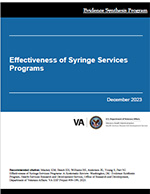
|
Recommended citation: |
Download PDF: Complete Report, Executive Summary, Report, Appendices
The evidence demonstrating the potential benefits of syringe services programs (SSPs) and relative lack of harms is sufficient to support SSP implementation when possible. SSP utilization likely lowers human immunodeficiency virus (HIV) transmission and reduces injection risk behaviors, and may lower hepatitis C (HCV) transmission, promote carrying naloxone, increase exposure to overdose education, and facilitate referral to and enrollment in treatment services. SSP use and presence in communities does not appear to increase injection frequency, unsafe syringe disposal practices, or neighborhood crime rates.
Substance use-related harms including drug overdose deaths and new cases of HIV and HCV are increasing in the US. SSPs distribute sterile syringes with the aim of mitigating the negative consequences of injection drug use, in line with the principles of harm reduction. The present report is an attempt to provide an overall picture of what is known about the benefits and potential harms of SSPs.
Out of 3,787 potentially relevant articles, we included 100 primary studies and 17 systematic reviews. A 2022 review of reviews found sufficient evidence that SSPs prevent HIV transmission and tentative evidence that SSPs prevent HCV transmission. This review also found sufficient evidence that SSP use reduced injection risk behaviors. Based on a synthesis of primary studies, SSP use does not appear to increase injection frequency, unsafe disposal of syringes, or neighborhood crime rates. SSP use may be associated with increased treatment linkage and/or use of treatment services compared to no SSP use (or less use). While our confidence in findings for each individual outcome included in this review is low due to methodological limitations inherent in studies of public health interventions in real-world settings, the preponderance of evidence demonstrating the potential benefits of SSPs and relative lack of harms is more than sufficient to support SSP implementation when possible.